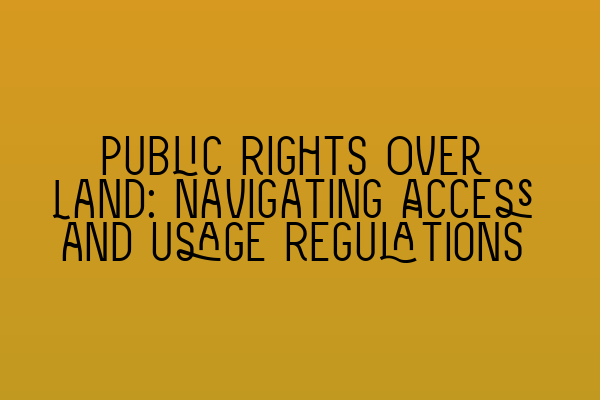Public Rights Over Land: Navigating Access and Usage Regulations
Welcome to the SQE Property Law & Land Law blog, where we provide expert insights into various legal topics. Today, we will be discussing public rights over land and how to navigate the complex regulations surrounding access and usage. Understanding these rights is crucial for property owners, developers, and anyone involved in land transactions.
Public rights over land refer to the legal permissions and restrictions regarding public access and usage of privately-owned land. These rights are essential for maintaining a balance between private property rights and the public’s interest in accessing certain areas.
Types of Public Rights Over Land
There are several types of public rights over land that individuals should be familiar with:
- Right of Way: A right of way grants individuals the legal right to enter or pass through a property owned by someone else. This is commonly seen in the context of footpaths, bridleways, and public highways.
- Right to Roam: In certain areas, such as mountains, moors, and common land, individuals may have the right to roam freely, even on privately-owned land. This right promotes access to natural spaces and outdoor activities.
- Right to Access Water: In England and Wales, public rights of access to water bodies, such as rivers, lakes, and coastal areas, exist to ensure that individuals can enjoy recreational activities like fishing, boating, and swimming.
- Right to Use Common Land: Common land refers to areas owned by multiple individuals or communities. The public may have the right to use these spaces for various activities, including grazing livestock, gathering firewood, or even holding events.
Navigating Access and Usage Regulations
Given the complexity and nuances involved in public rights over land, it is crucial to understand the applicable regulations. Failure to comply with these regulations can have legal consequences. Here are some essential considerations:
Research and Understanding
Prior to purchasing or developing land, it is vital to conduct thorough research to identify any existing public rights over the property. Engaging the services of a property law expert can help ensure that all relevant information is uncovered. Understanding the scope and limitations of these rights is crucial for making informed decisions.
Furthermore, staying up to date with relevant legal developments and case law is essential. SQE Contract Law: Analyzing Landmark Cases and Influential Judicial Decisions provides valuable insights into the legal precedents that have shaped the current understanding of public rights over land. Make sure to check it out for in-depth analysis.
Notification and Consultation
When carrying out development projects that may impact existing public rights, it is crucial to notify and consult with the appropriate authorities and affected individuals. This ensures that potential issues are addressed and that the rights of the public are appropriately considered.
Identifying and Marking Boundaries
Clearly identifying and marking the boundaries of your property is essential for managing public rights over land. This includes displaying signage, maintaining fences or walls, and keeping access points clear. By doing so, you can help prevent any unintentional infringements on your property rights.
Understanding Contractual Capacity: Rights and Limitations is another valuable resource for property owners and developers to better grasp the legal requirements when negotiating and entering into agreements related to public rights over land.
Legal Advice and Dispute Resolution
In the event of disputes or conflicts regarding public rights over land, seeking legal advice from an experienced property law solicitor is crucial. They can provide guidance on your rights and obligations, as well as assist in resolving any issues through negotiation or litigation.
Consider joining our SQE Contract Law webinars to gain expert insights and guidance on various property law topics, including public rights over land. Our webinars provide a unique opportunity to interact with industry professionals and expand your knowledge.
Conclusion
Public rights over land play a vital role in balancing the interests of private property owners and the public’s need for access and usage of certain areas. Understanding and navigating the regulations surrounding these rights is essential for property owners, developers, and anyone involved in land transactions.
If you want to enhance your knowledge and preparation for SQE Property Law & Land Law exams, check out SQE Prep: Mastering the Essentials of Contract Law. It offers comprehensive resources and practice tests to ensure you are fully prepared.
Thank you for reading our blog post on public rights over land. We hope you found it informative and insightful. Stay tuned for more legal insights from SQE Property Law & Land Law!
